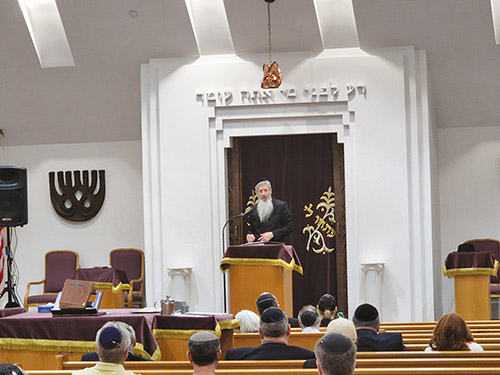


More than 75 people gathered from various parts of New Jersey to hear Rabbi Dovid Goldwasser deliver a powerful presentation called “teshuva—The Power to Change” at the Young Israel of East Brunswick (YIEB) on Tuesday evening, September 13. Rabbi Joshua Hess welcomed Rabbi Goldwasser to YIEB and noted that the audience would be inspired by the strength (chizuk), inspiration and insights of Rabbi Goldwasser’s presentation and personal style.
Rabbi Goldwasser stated that the key premise to teshuva is knowing yourself. He said that without knowing your own strengths and weaknesses, it is not possible to create a program or plan for change or improvement. We still suffer today because of Adam’s sin. When Hashem asked Adam what he did, Adam said “I ate, and I will eat in the future.” How could Adam answer in such a way? Rabbi Goldwasser quoted Michtav Eliyahu that said the answer Adam gave was a good one because it showed that Adam knew himself well enough to state his weakness and inability to abstain from eating the fruit. Understanding himself was Adam’s first step towards positive change.
How can we change in the coming year? Rabbi Goldwasser suggested that listeners consider doing more chesed, adding another mitzvah to ones they already do and working on behalf of the Jewish community. “Hashem says everyone has the potential to rise higher—we just have to start.”
Rabbi Goldwasser related the story of a woman he overheard at the Kotel asking Hashem for forgiveness as she had done something wrong. The woman added that a father won’t turn their child out of the house because they made a mistake. “Here I am at your house, Hashem, please help me and don’t turn me out.” The power of teshuva is to repent where we will receive a pardon in return and gain forgiveness from Hashem. It is understandable to see teshuva as something based on fear and performed to avoid punishment. There is, however, a stronger and more difficult form of teshuva—a teshuva based on ahava (love) and appreciation of Hashem. While teshuva based on love may be more difficult, the ultimate reward is commensurate.
Rabbi Goldwasser shared several anecdotes that showed the power of divine intervention and the miraculous presence of Hashem in our lives and in the entire world. The key is understanding ourselves and how we can each become a better person. Sins are not only non-observance of Shabbat, stealing or eating unkosher food. Sins are also being unable to control our anger, not being nice to others or succumbing to jealousy, according to the Rambam. We must all take the time to strive to become better people.
Even increasing our learning of Torah by five minutes per day can help our personal growth and teshuva. It does not matter when in life the teshuva occurs—it can happen at any point as long as the person is still alive. Rabbi Goldwasser gave the example of Israeli film director and actor Uri Zohar, who became the inspiration to many after he left the life of a jet-setting movie star to become a chasidic rabbi.
The program was sponsored by Ralph and Bea Rosenbaum and presented by the YIEB Adult Education Committee. Ralph, described by Rabbi Hess as one of Rabbi Goldwasser’s “chasidim,” had been listening to the Torah segment on the Nachum Segal show for about 10 years and felt it was a good way to focus on the month of Elul.
Rabbi Goldwasser’s presentation energized many listeners. Alan Segall came from Florham Park, New Jersey, to hear Rabbi Goldwasser. Having heard him speak in person about 12 years ago and being a loyal radio listener, he said he knew it would be a real treat. Eric Wallenstein of Highland Park had a connection to Rabbi Goldwasser and wanted to hear him speak in person. Mara Margolin came from Edison to enjoy the presentation style she hears daily on the radio. Phil Englard of East Brunswick, also a fan, came to hear the presentation and brought his wife, Sara. Sharon Shulman of East Brunswick wanted to hear the speaker and thought it would be an interesting topic. No matter where they were from, attendees all had glowing reviews of the speaker and his message.
By Deborah Melman












